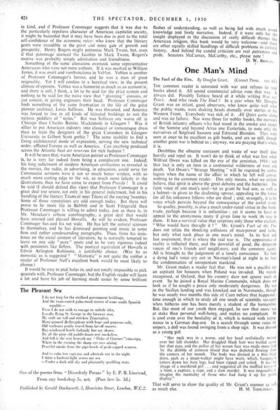One Man's Mind
The Fuel of the Fire. By Douglas Grant. (Cresset Press. s as.
6d.)
THE common reader is saturated with war and refuses to read books about it. All sound commercial advice runs that way. It always did. Possibly Tolstoy heard of it while writing War mid Peace. And who reads The Iliad ? In a year when Mr. Douglas Grant was an infant, good observers, who knew quite well what the public wants, were shaking heads dismally over stories of the Western Front. Everybody was sick of it. All Quiet came along and was no failure. Nor were those far nobler books, the memoirs of British infantry officers who had stood in the smoke and stench of the Somme and beyond Arras one Eastertide, to note only the narratives of Siegfried Sassoon and Edmund Blunden. They were seen at once to be excellent as gift books, and are so still, though another great war is behind us ; anyway, we are praying that's where it is.
Doubtless the obscene unreason and waste of war itself does horrify and repel us. It won't do to think of what was lost when Wilfred Owen was killed on the eve of the armistice, 1918 ; and that fact is only an item in a continental wilderness of ruin and death. Yet Owen's " Strange Meeting " will be required by antho- logists when the name of the affair in which he fell will convey nothing to the common reader. This only means, what we seldom believe, that spirit is above the great debates and the batteries. The faint voice of one man's soul—let us grant he had one, as well as a helmet—is given to the deafening uproar, appealing to the future for all his unknown fellows who are dead ; and, strangely, it is his voice which persists beyond the consequence of the awful event So quality, possibly, is also a much under-rated virtue in the book- trade, perhap's because it is unfamiliar ; yet it seems to have an appeal to the anonymous many if given time to work its way to them. It has a survival value that surprises only those who exclaim, " Who would have thought it ? " Mr. Grant's Fuel of the Fire does not relate the shocking collisions of man-power and tanks, but only what took place in one man's- mind. . In its first and last assessment, that is where the real war is. The appearance of reality is reflected there, and the downfall of good, the desperate voices of one's friends and neighbours, and the common agony. All is brought to the judgement of a lonely conscience. To hear a dying lad's voice cry out in No-man's-land at night is to hear the condemnation of unrepentant mankind.
Mr. Grant makes a reader feel that. He was not a pacifist not an aspirant for honours when Poland was invaded. He merely recognised, at Oxford, that his country dare not -ignore such an event. So he joined a Royal Marine Commando, which does not look as if he sought a peace only moderately dangerous. He was in the Sicilian landing and was knocked out in Normandy, though he was nearly two months this side of Caen before that happened; time enough in which to study all one needs of scientific savagery when hitherto one has been merely a student of the humanities. But, like most of our youth then engaged, he saw that more was at stake than personal well-being, and makes no complaint. He is cool even over the bestiality of it, which is noticed with repug- nance in a German dug-out. In a search through some ruins for snipers, a doll was found swinging from a shop sign. It was dressed as a young girl.
" Her neck was in a noose, and her head realistically twisted over her left shoulder. Her draggled black hair was trailed across her shut eyes, and the pallor of her waxen face was made more livid by the dribble of crimson blood that was depicted flowing from the corners of her mouth. The body was dressed in a thin black dress,,such as a street-walker might have worn, wItich, hanging in tatters down her bare legs, had been ripped and soiled. It was the image of a murdered girl ... and suggested all the muffled terror of a hunt, a capture, a rape, and a slow murder. It was impossible to imagine the mentality of those who had hung it up for public display." That will serve to show the quality of Mr. Grant's manner as well






































 Previous page
Previous page